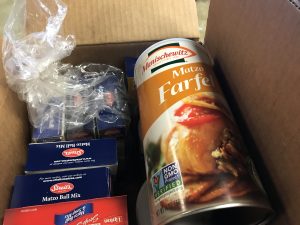 Gefilte fish, matzoh ball soup mix, farfel and other kosher for Passover foods fill the shelves of the Polack Food Bank before the holiday each year.
Gefilte fish, matzoh ball soup mix, farfel and other kosher for Passover foods fill the shelves of the Polack Food Bank before the holiday each year.
While the Food Bank provides a monthly opportunity for individuals and families who keep a kosher kitchen, the offering before Passover has an additional significance, explained Food Bank Manager Esther Magasis. “Food is such an intrinsic part of the Passover seder and the tradition of the holiday, but Passover items are often more difficult to find and more expensive to buy.”
While the Passover observance includes specific kosher foods, there are other observances that can affect vulnerable individuals and families. “These traditions include the purging of chametz, food made with leaven that could rise, such as bread,” Esther noted. “This could potentially mean a loss of food for observant Jews who are already on a tight budget.”
Jewish Family Service understands how to meet these particular needs and so the agency works to help ensure that those who want to celebrate with friends and family have access to the foods necessary to observe the festival.
The traditions of Passover also echo the 125-year tradition of JFS welcoming the stranger. Esther recalled how her family always ate with their door open on Passover to let Elijah in as part of the seder. Her father explained to her that Elijah would come as an unknown guest, and therefore, she should treat everyone she met with kindness.
“To me, Passover is a time to remember the shared Jewish history of struggle and of freedom,” she said. “And, to welcome the world to sit with us at our table, knowing the beauty that each person holds.”
Editor’s Note: Brian Sindel, the former Food Bank Specialist, is now the Polack Food Bank Manager.



